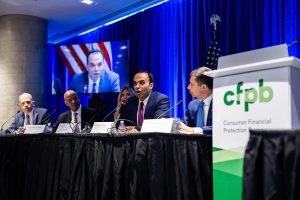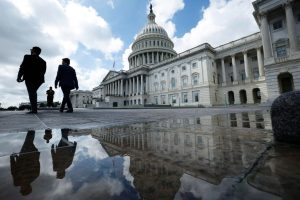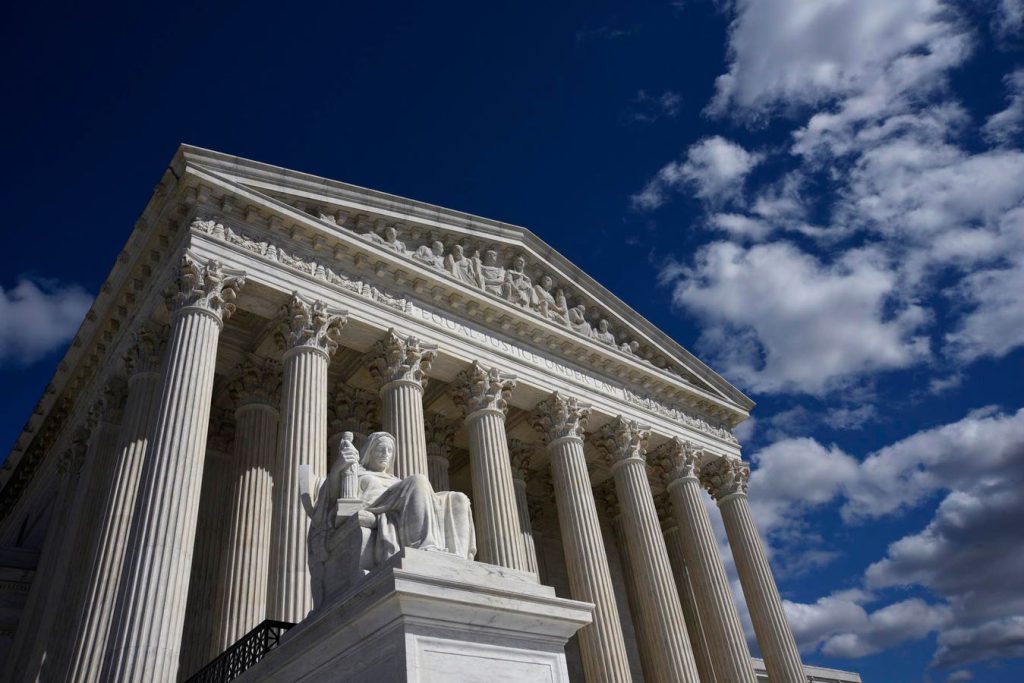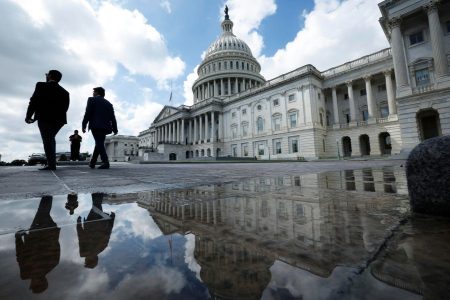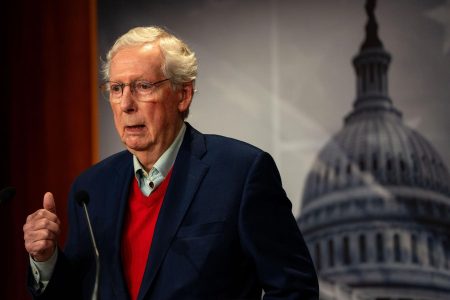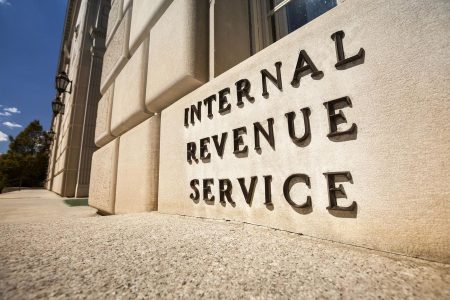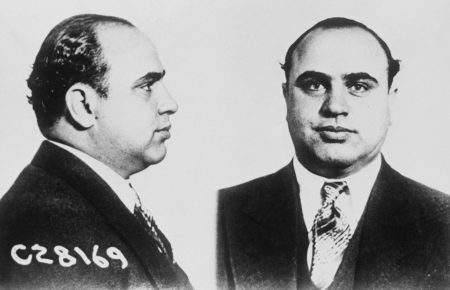Libin Zhang and Kristin Hickman discuss the broader implications of Moore v. United States and the challenges to the Chevron doctrine during a live recording from the American Bar Association Section of Taxation May meeting.
This transcript has been edited for length and clarity.
David D. Stewart: Welcome to the podcast. I’m David Stewart, editor in chief of Tax Notes Today International. This week: we’ll do it live.
We have something a bit different for this episode. On Friday, May 3, I went down to the ABA May Tax Section Meeting and recorded a live podcast. My guests were Libin Zhang and Kristin Hickman, who I’ll introduce more in a bit.
On previous episodes, we covered Moore [v. United States] and the possible end of the Chevron doctrine, but this time we’re bringing those two issues together and asking what this could mean for tax policy. I hope you enjoy the interview as much as I did when I recorded it. And now, let’s go to that interview.
And now welcome to a live recording of the Tax Notes Talk podcast. With the Supreme Court taking up a case on what seemed like settled questions of law in Moore v. U.S. and greater scrutiny of agency decisions, including the possibility that the 40-year-old Chevron doctrine could be overturned, what is the outlook for tax policy? Are we entering into an era of greater uncertainty where previous assumptions about the taxing power and the IRS are facing questions?
To help us explore that, I’m joined by Libin Zhang. He’s a partner with Fried, Frank, Harris, Shriver & Jacobson LLP in New York. There, he advises clients on a diverse range of real estate, corporate, and international taxation matters, and he occasionally writes about tax-related issues, including in Tax Notes.
Kristin Hickman is the McKnight Presidential Professor in Law at the University of Minnesota Law School. She’s a leading authority in the fields of tax administration, administrative law, and statutory interpretation. Her articles on these topics have appeared in many books and journals, including Tax Notes. Recently, she’s spoken extensively on Chevron deference and its implications.
So let’s start off with the Moore case. We have this case that’s been taken up by the Supreme Court on the question of when can income be taxed? When is it income, really? Which seemed like we all assumed the answer to that before, but the Supreme Court’s actually taking this up, so what can we read into them even hearing the case?
Libin Zhang: Yeah. I think that’s a very great question. I think part of the issue is that you mentioned these are settled questions of law, but there seems to be a lot of debate over what the actual answer is. Is Eisner v. Macomber still good law? Is there a realization requirement in the 16th Amendment in the tax law? And also, did the Ninth Circuit reach the wrong decision or say too broad language in this decision? So I think it’s good that the Supreme Court is having taken interest in these tax cases and, perhaps, reining in some of the broad language that the lower circuits have been writing about.
Kristin Hickman: So I want to take a step back for a minute and recognize, with respect to Moore, that I think you can’t really look at as a tax case. You have to look at it as a constitutional law case. Sure, it involves the taxing power, but as tax attorneys, we like to get swept up into the conversation about tax policy, which of course is very important to all of us.
But I think from the perspective of the justices, they are thinking, I suspect anyway, I have no real firsthand insight here, but I do think that they are focusing on this case through a slightly different lens, at least in the context of economic and regulatory matters. There, among some justices at least, is very much of a perception of government versus the little guy, with concern for the little guy.
And at least as this case has been presented to the court with the petitioners, it’s a married couple, individuals; you’re not looking at a great, big multinational corporation versus the government in this particular case.
I think they’re very concerned about methodology, originalism, textualism. The justices are very concerned about expansive governmental power and potential federal government overreach. And so at least as I look at this case, those are some of the dynamics that I see coming into play.
On a certain level, realization is something you learn about in basic federal income tax, which is probably the only tax course any of these justices ever took. It triggers a very visceral reaction, I think. And so you put all of those things together, and I suspect that’s how they’re looking at this case rather than thinking of it in terms of technical tax policy.
Now, of course, the briefing brought in the technical tax policy, and that may give them pause, but I think we have to appreciate the bigger constitutional picture that’s going on here rather than just focusing on it as a tax case.
David D. Stewart: Well, bringing it back to tax, I suppose.
Kristin Hickman: Sure.
David D. Stewart: But within that constitutional context, so we have the federal government’s taxing power is basically used for every area of tax policy. Is this an era where we’re going to see that constitutional authority get reined in by the Supreme Court potentially?
Libin Zhang: Yeah, I think potentially you saw that a little bit with the district court decision on the Corporate Transparency Act (CTA), where one of the arguments the government used was that the CTA was justified by the taxing power and the judge didn’t buy that argument.
Now, we’ll see if this thing gets overturned on appeal or not. But definitely for a long time under the commerce clause, people thought the commerce clause was unlimited, and then suddenly with Lopez and Morrison in the ’90s, that got reined in a little bit. And that’s something we could definitely see in the taxing world as well, especially as we saw from the discussions in Moore, maybe not everything in the world is income that can be taxed under the 16th Amendment.
Kristin Hickman: Yeah. I mean, certainly in Moore, depending on what the Court does with it, you could see some reining in. I’m not so sure with respect to the commerce clause argument in the Corporate Transparency Act case. I will point to the Supreme Court’s decision in NFIB v. Sebelius, where they upheld the Affordable Care Act and the shared responsibility payment under that act on taxing power grounds. So I don’t think the trend is necessarily all in one direction, but certainly so much hangs on what happens in Moore irrespective of what happens with the commerce power.
Libin Zhang: I think also as the government, or maybe just academics, are thinking about new kinds of taxes — wealth taxes and mark-to-market taxation — that’s going to be pushing the envelope on the limits of the government’s taxing power. And you saw some of this in the questioning in Moore, where some of the justices were asking about wealth taxes, so they definitely have that in mind as to whether there is some outer limit on the kinds of taxes the government can impose.
David D. Stewart: Is that likely the reason why they took up Moore, was to set out a marker on those other taxes?
Libin Zhang: Yeah. I think that’s one of the theories that people have subscribed to, especially that the Ninth Circuit opinion could be interpreted as giving free rein to these other kinds of taxes as well.
Kristin Hickman: Yeah. I think some of it is the fact that it came out of the Ninth Circuit. The Ninth Circuit is the most overturned circuit, I believe, in the country. But again, I think some of the reason they took the Moore case is more in terms of this concern about governmental power in general and government versus the little guy.
David D. Stewart: OK. Well, let’s turn to another area of interest that the Supreme Court has taken on, and that is these two cases where they might potentially strike down this long-standing precedent of Chevron deference. Does that raise questions about the ability of Treasury and the IRS to issue tax regulations going forward?
Kristin Hickman: So my own view on this is that they’re not going to overturn Chevron, They may modify it, but I’m skeptical that they’ll overturn it outright. Chevron‘s a funny doctrine. It’s been around for 40 years, but it’s not as though over that 40 years it hasn’t gone through several different evolutions.
Not to mention the fact that you’ve never really had agreement among the justices about what Chevron is and how it functions. And you saw that in the oral argument in Loper Bright [Enterprises v. Raimondo] and Relentless [Inc. v. Department of Commerce].
When it comes to Treasury and IRS rulemaking No. 1, I’m not sure in the mine-run of regulation projects that Treasury is or even needs to be all that concerned about courts overruling what they’re coming up with. Most tax regulations never see the inside of a courtroom, at least not in terms of substantive challenges, and there’s evidence irrespective of whatever standard of review is used. There’s evidence that courts vary the amount of deference they give in practice based to some extent on subject matter area, not explicitly by any stretch. But tax is one of those areas that you’re going to see historically more deference rather than less, probably because of the complexity and just the nature of the topic in terms of judicial concerns when you’re talking about generalist judges.
So when you put all of that together, I think that Treasury and the IRS may have a little bit less discretion in terms of boundary pushing. We can all point to some set of regulations where there’s really some legitimate question about whether Treasury has the authority to regulate in a particular area. King v. Burwell comes to mind with the Affordable Care Act again, and of course the IRS won that case, but the mine-run of regulation projects just aren’t like that case. In those marginal, boundary-pushing cases, then yeah, maybe Treasury and IRS will feel a little bit less room to navigate, but that’s not most regs.
Libin Zhang: Yeah. So I would say we saw a little bit of this issue when a couple years ago the Supreme Court was looking at Auer deference, which is regulatory agencies interpreting their own regulations, and people thought, “Oh, maybe the Auer deference doctrine would get overturned,” which is analogous to Chevron, but instead, in Kisor, the Supreme Court just reined it in a little bit, but it still survives. So I think that’s probably what’s going to happen. It takes a more incremental step.
But even if they did overturn Chevron completely, let’s say, it doesn’t mean regulations are worthless. You still have Skidmore doctrine, which is that the courts will look at the expertise of the agency, use it as one of the factors in weighing these regulations. And under that standard, the government’s still going to win, I imagine, most of the time, given its expertise on these issues.
Kristin Hickman: Yeah. I do think it’s important to recognize that deference long predates Chevron. We’ve had judicial deference to agency interpretations of statutes since at least the 1930s under a variety of different labels. And I will add with respect to the reference to Kisor, during oral argument in Loper Bright and Relentless, Justice Barrett asked Solicitor General Prelogar what a “Kisor-ized” Chevron might look like, and the solicitor general proceeded to articulate a variety of different points. That, to be perfectly candid, sounds a lot, to me anyway, like how Chevron already operates. So that’s one of the reasons why I’m a little bit skeptical that that much is really going to change on the ground.
Libin Zhang: I mean, there could be definitely situations where, under current Chevron, government’s view is not the best reading, but it’s reasonable and the Court will uphold it, whereas under a new doctrine, the Court will overturn it. But I think that just means, I feel, like Treasury and IRS should work harder to provide better justification for its roles, which is doing their job.
David D. Stewart: So does this tie in with the more scrutiny the regulations are getting under the Administrative Procedure Act as well?
Kristin Hickman: Oh, I think in broad terms, to some extent, yes. If you think about the trend as being concern about government overreach, particularly against the little guy, then anytime you’re getting greater scrutiny of regulations, I think right now that’s part of it.
I will make a note, though, that the greater scrutiny that Treasury regulations are getting under the Administrative Procedure Act is in tension with a different trend, at least among certain judges and justices, to interpret the administrative Procedure Act in a very hypertextualist kind of a way that actually limits some of the doctrines under that statute relative to how courts have applied them in the past. So you’ve got greater scrutiny in the tax area but maybe a little bit less scrutiny in some other areas as we reshape those doctrines, and so I tend to think tax is a little bit of an outlier there.
Libin Zhang: I think a lot of the APA challenges are on regulations that maybe are not within the language of the statute, like about the dividends received deduction, that’s in the Liberty Global case, for example. And that just goes back to this issue, this thing that’s always bothered me, which is on the one hand, we say under Chevron the federal government is an expert at all this and should get deference, but then on the other hand, the federal government is the one writing these statutes that have all these typos and glitches in the first place. Maybe they should have some of the experts work on the statute so that the issues are more covered and we don’t have gaps and typos, so maybe Congress should work a little bit harder in writing better statutes in the first place.
Kristin Hickman: It’s unfortunate that we’ve come to an era in which we don’t get the technical corrections bills that we used to get because that did a lot. And instead we’re relying on an agency to try to fix those issues with the drafting.
David D. Stewart: So given the reality of the world that we’re living in now, what are you expecting? What should we be watching for in the future?
Kristin Hickman: So it’s really hard to say. I mean, I’ve never been a great prognosticator when it comes to this stuff. And at the moment, we are in such a position of political realignment and upheaval as well as some real transitions in judicial decision-making, where the Supreme Court is more originalist, more textualist, more formalist than it has been in a century at least. And how you put all of that together is really difficult to predict what might come out of it.
I do think in the tax context — and to me this is a good thing, although I’m not sure that everyone agrees — we are seeing greater attention from Treasury and the IRS to, I think, transparency and accountability and when it comes to rulemaking, as well as they’ve got this new plan for making the IRS and the tax system, I think, more accessible to a broader array of people, and there’s some transparency involved in that too.
So that’s something from not a court side but from an administrative side; those are trends that I think are very positive.
Libin Zhang: Yeah. I think regardless of what happens with Chevron, I think one thing that we’re going to see is more scrutiny about just the regulations that’s coming out and whether they really are consistent with the statute, especially when the regulations go much beyond what the statute is saying.
For example, we have this new stock buyback tax, which the statute is, I don’t know, like a page and a half. Treasury recently came out with 300 pages of final regulations. That’s a lot in terms of the ratios there. And some of those rules maybe are not, are a little bit on the fringe there, and there might be some debate about challenging those.
So I think that’s something that we’ll see. Just maybe if Congress wants something to be spelled out, they should write it in the statute instead of leaving it to the regulators.
David D. Stewart: All right. Well, it sounds like we’ve got a lot to keep an eye on and a lot of interesting cases coming down the road. Kristin, Libin, thank you for being here.
Kristin Hickman: Thank you.
David D. Stewart: Thank you all.
Again, I’d like to thank my guests, Libin Zhang and Kristin Hickman, for joining me.
Read the full article here



